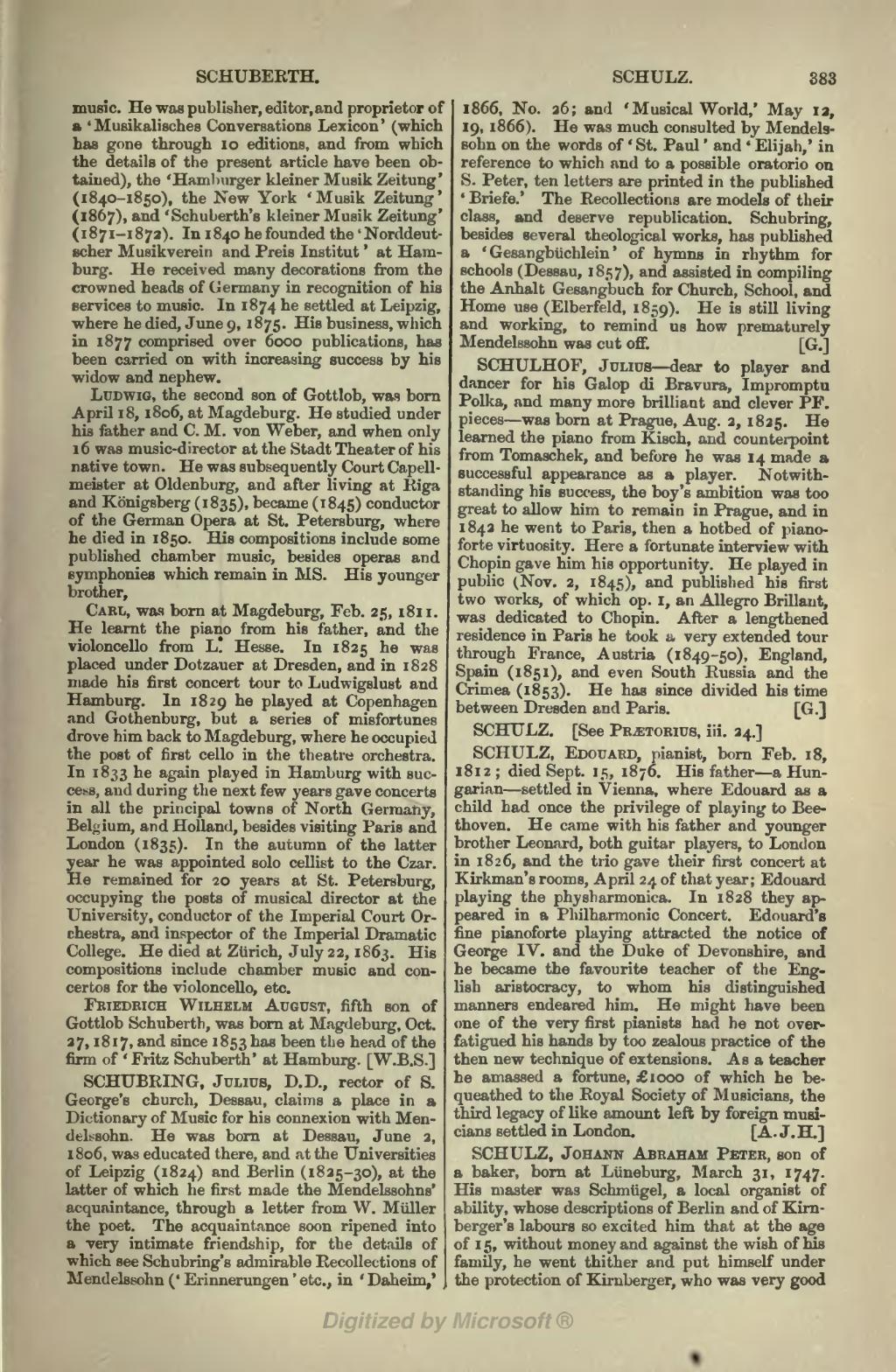music. He was publisher, editor, and proprietor of a 'Musikalisches Conversations Lexicon' (which has gone through 10 editions, and from which the details of the present article have been obtained), the 'Hamburger kleiner Musik Zeitung' (1840–1850), the New York 'Musik Zeitung' (1867), and 'Schuberth's kleiner Musik Zeitung' (1871–1872). In 1840 he founded the 'Norddeutscher Musikverein and Preis Institut' at Hamburg. He received many decorations from the crowned heads of Germany in recognition of his services to music. In 1874 he settled at Leipzig, where he died, June 9, 1875. His business, which in 1877 comprised over 6000 publications, has been carried on with increasing success by his widow and nephew.
Ludwig, the second son of Gottlob, was born April 18, 1806, at Magdeburg. He studied under his father and C. M. von Weber, and when only 16 was music-director at the Stadt Theater of his native town. He was subsequently Court Capellmeister at Oldenburg, and after living at Riga and Königsberg (1835), became (1845) conductor of the German Opera at St. Petersburg, where he died in 1850. His compositions include some published chamber music, besides operas and symphonies which remain in MS. His younger brother,
Carl, was born at Magdeburg, Feb. 25, 1811. He learnt the piano from his father, and the violoncello from L. Hesse. In 1825 he was placed under Dotzauer at Dresden, and in 1828 made his first concert tour to Ludwigslust and Hamburg. In 1829 he played at Copenhagen and Gothenburg, but a series of misfortunes drove him back to Magdeburg, where he occupied the post of first cello in the theatre orchestra. In 1833 he again played in Hamburg with success, and during the next few years gave concerts in all the principal towns of North Germany, Belgium, and Holland, besides visiting Paris and London (1835). In the autumn of the latter year he was appointed solo cellist to the Czar. He remained for 20 years at St. Petersburg, occupying the posts of musical director at the University, conductor of the Imperial Court Orchestra, and inspector of the Imperial Dramatic College. He died at Zurich, July 22, 1863. His compositions include chamber music and concertos for the violoncello, etc.
Friedrich Wilhelm August, fifth son of Gottlob Schuberth, was born at Magdeburg, Oct. 27, 1817, and since 1853 has been the head of the firm of 'Fritz Schuberth' at Hamburg.
[ W. B. S. ]
SCHUBRING, Julius, D.D., rector of S. George's church, Dessau, claims a place in a Dictionary of Music for his connexion with Mendelssohn. He was born at Dessau, June 2, 1806, was educated there, and at the Universities of Leipzig (1824) and Berlin (1825–30), at the latter of which he first made the Mendelssohns' acquaintance, through a letter from W. Müller the poet. The acquaintance soon ripened into a very intimate friendship, for the details of which see Schubring's admirable Recollections of Mendelssohn ('Erinnerungen' etc., in 'Daheim,' 1866, No. 26; and 'Musical World,' May 12, 19, 1866). He was much consulted by Mendelssohn on the words of 'St. Paul' and 'Elijah,' in reference to which and to a possible oratorio on S. Peter, ten letters are printed in the published 'Briefe.' The Recollections are models of their class, and deserve republication. Schubring, besides several theological works, has published a 'Gesangbüchlein' of hymns in rhythm for schools (Dessau, 1857), and assisted in compiling the Anhalt Gesangbuch for Church, School, and Home use (Elberfeld, 1859). He is st111 living and working, to remind us how prematurely Mendelssohn was cut off.
[ G. ]
SCHULHOF, Julius [App. p.791 "correct name to Schulhoff]—dear to player and dancer for his Galop di Bravura, Impromptu Polka, and many more brilliant and clever PF. pieces—was born at Prague, Aug. 2, 1825. He learned the piano from Kisch, and counterpoint from Tomaschek, and before he was 14 made a successful appearance as a player. Notwithstanding his success, the boy's ambition was too great to allow him to remain in Prague, and in 1842 he went to Paris, then a hotbed of pianoforte virtuosity. Here a fortunate interview with Chopin gave him his opportunity. He played in public (Nov. 2, 1845), and published his first two works, of which op. 1, an Allegro Brillant, was dedicated to Chopin. After a lengthened residence in Paris he took a very extended tour through France, Austria (1849–50), England, Spain (1851), and even South Russia and the Crimea (1853). He has since divided his time between Dresden and Paris.
[ G. ]
SCHULZ. [See Prætorius, iii. 24.]
SCHULZ, Edouard, pianist, born Feb. 18, 1812; died Sept. 15, 1876. His father—a Hungarian—settled in Vienna, where Edouard as a child had once the privilege of playing to Beethoven. He came with his father and younger brother Leonard, both guitar players, to London in 1826, and the trio gave their first concert at Kirkman's rooms, April 24 of that year; Edouard playing the physharmonica. In 1828 they appeared in a Philharmonic Concert. Edouard's fine pianoforte playing attracted the notice of George IV. and the Duke of Devonshire, and he became the favourite teacher of the English aristocracy, to whom his distinguished manners endeared him. He might have been one of the very first pianists had he not overfatigued his hands by too zealous practice of the then new technique of extensions. As a teacher he amassed a fortune, £1000 of which he bequeathed to the Royal Society of Musicians, the third legacy of like amount left by foreign musicians settled in London.
[ A. J. H. ]
SCHULZ, Johann Abraham Peter, son of a baker, born at Lüneburg, March 31, 1747. His master was Schmügel, a local organist of ability, whose descriptions of Berlin and of Kirnberger's labours so excited him that at the age of 15, without money and against the wish of his family, he went thither and put himself under the protection of Kirnberger, who was very good
